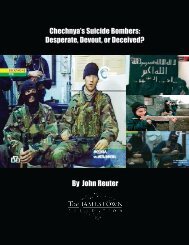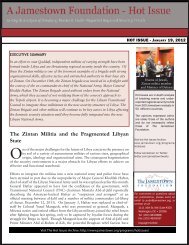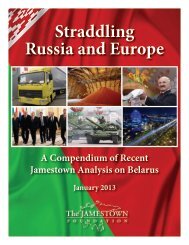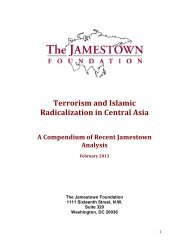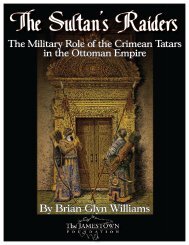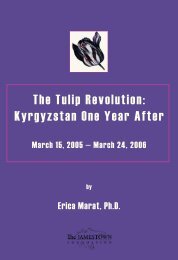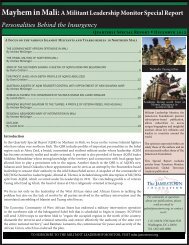ChinaBrief In a Fortnight - The Jamestown Foundation
ChinaBrief In a Fortnight - The Jamestown Foundation
ChinaBrief In a Fortnight - The Jamestown Foundation
Create successful ePaper yourself
Turn your PDF publications into a flip-book with our unique Google optimized e-Paper software.
<strong>ChinaBrief</strong> Volume XII s Issue 21 s November 6, 2012<br />
Xiong. At the time, Zhang had served in a variety of<br />
senior operational and staff positions as well as penned<br />
a number of articles on different PLA priorities (Wen<br />
Wei Po, December 20, 2005; Outlook Weekly, December<br />
9, 2002; PLA Daily, January 30, 2001; January 14, 1997).<br />
Although Ma’s replacement, former political commissar<br />
Wang Guanzhong, is not as operationally experienced<br />
as his two predecessors, Wang’s service in the Central<br />
Military Commission’s (CMC) General Office for the last<br />
16 years should give him a high-level, detailed knowledge<br />
of the PLA and its senior decision-making tempo. Wang<br />
also rose through the ranks of the <strong>In</strong>vestigation and<br />
Research Office (diaoyanju), an experience that probably<br />
gave him a fairly sophisticated knowledge of the state of<br />
the PLA (People’s Net, October 23).<br />
Choosing an outsider to the intelligence system to lead it<br />
helps the PLA keep its intelligence organizations focused<br />
on military priorities and more directly under control.<br />
Previously, career defense attachés like Xiong dominated<br />
the principal military intelligence department, the Second<br />
Department of the PLA General Staff Department<br />
(2PLA). This led to a focus on foreign affairs rather<br />
than military priorities, lending 2PLA the moniker of<br />
“China’s CIA” (Chien Shao [Hong Kong], January 1,<br />
2006). During the 1990s, President Jiang Zemin came to<br />
rely on Xiong and even tried to install him as Minister of<br />
State Security (South China Morning Post, March 18, 1998).<br />
As PLA modernization pushed the military to rely ever<br />
more heavily on intelligence for operations as part of<br />
informatization (xinxihua), Xiong’s continuing presence<br />
through 2006 probably inhibited 2PLA’s adherence to<br />
the rest of the PLA’s modernization program because<br />
he lacked the operational experience. His successors,<br />
however, could not turn the intelligence apparatus into<br />
their private reserve and had the experience to tie military<br />
intelligence more closely to military needs.<br />
Senior PLA intelligence personnel also have been<br />
spreading out, suggesting this experience is being valued<br />
in the PLA as it was not previously. <strong>The</strong> first to make<br />
the jump was Assistant Chief of the General Staff Chen<br />
Xiaogong, who moved to become one of the PLA Air<br />
Force deputy commanders in 2009. This transfer may<br />
have been politically motivated to prevent the emergence<br />
of another Xiong, because, after his stint in the party’s<br />
Foreign Affairs Office, Chen was rumored to be close<br />
with Hu Jintao (People’s Net, October 23; “Personnel<br />
2<br />
Changes in PLA Ranks: Chen Xiaogang,” China Brief,<br />
February 9, 2009; Ming Pao, January 21, 2009). Since then,<br />
Chen’s successor at 2PLA, Yang Hui, was promoted to be<br />
chief of staff of the Nanjing Military Region. At the same<br />
time, the last signals intelligence leadership, including<br />
both the commander and the political commissar, also<br />
moved on. <strong>The</strong> commander, Wu Guohua, became deputy<br />
commander of the Second Artillery, and the political<br />
commissar, Wang Yongsheng, became a vice president<br />
at National Defense University (Global Times, August 5,<br />
2011).<br />
<strong>In</strong>formation is at the heart of the PLA’s modernization<br />
program, so the rising importance of intelligence posts<br />
relative to their previous stature within the military<br />
should not be surprising. According to the PLA Daily<br />
and other writings on informatization, the challenges<br />
of fighting under informatized conditions require more<br />
efficient and effective means of collecting, processing<br />
and distributing intelligence. This also means integrating<br />
intelligence deeper into PLA operations transitioning<br />
away from a top-down intelligence distribution system<br />
(PLA Daily, October 28, 2008). Consolidation of this<br />
personnel trend at lower levels—such as operational<br />
rotations for mid-career intelligence personnel or new<br />
emphasis on intelligence-related education—would be<br />
the most important sign that intelligence is taking on<br />
greater relevance for the PLA at all levels.<br />
Peter Mattis is Editor of China Brief at <strong>The</strong> <strong>Jamestown</strong><br />
<strong>Foundation</strong>.<br />
***<br />
Professionalism and Factionalism<br />
in the PLA Leadership Selection<br />
By Willy Lam<br />
<strong>The</strong> Beijing leadership has reshuffled the high command<br />
of the People’s Liberation Army (PLA) as the military<br />
goes through its own leadership transition separate from<br />
but linked to the 18th Party Congress beginning later this<br />
week. <strong>The</strong> move, which was announced last week, has also<br />
given hints about the reorganization of the policy-setting<br />
Central Military Commission (CMC). <strong>The</strong> membership<br />
of a much rejuvenated CMC will be confirmed by the





